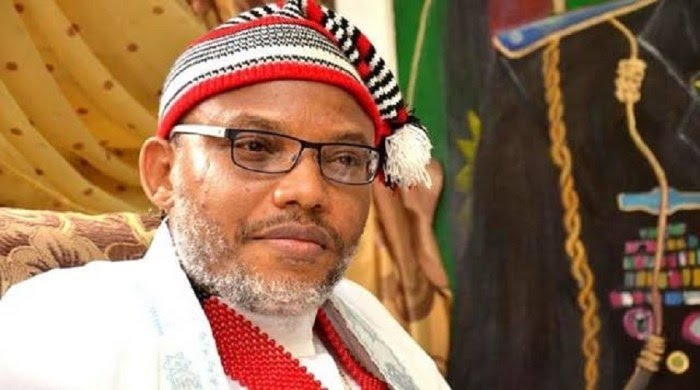News
FG Files Seven Amended Charges Against Kanu

Justice Binta Nyako has fixed Monday for Nnamdi Kanu’s team of lawyers and the Federal Government prosecution team to address the court based on the ongoing case between the leader of the proscribed Indigenous People of Biafra and the Federal Government.
This is coming after the Federal Government filed an amended seven counts of terrorism against the detained leader of IPOB.
The amended charge marked FHC/ABJ/CR/383/2015, was entered before the Federal High Court in Abuja, and contained all earlier sustained allegations against the IPOB leader.
As a result of the amended charges, it is to be argued whether the FG could proceed to re-arraign the IPOB leader on the amended charges despite the October 13 judgement.
The Court of Appeal had discharged Kanu of all the allegations as well as appeals on the subject matter still pending before the Supreme Court.
However, the FG, in the new amended charges alleged that Kanu had issued a deadly threat via a broadcast, heard and received across the country that anyone who disobeyed his sit-at-home order in the south-eastern states should write his or her will.
It also contended that the resulting effect of the broadcast had caused banks, schools, markets, shopping malls, fuel stations in the eastern states part of the country to shut down their business operations affecting citizens and leading to grounding of vehicular movements.
READ ALSO: Nnamdi Kanu Issues Seven Directives To IPOB, Supporters Ahead Of S’Court Ruling
The Federal Government further alleged that the IPOB leader had between 2018 and 2021, made inciting broadcasts, received and heard in Nigeria, instigating the public to hunt and kill Nigerian security personnel and their family members, thereby committing an offence punishable under Section 1 (2) (h) of the Terrorism Prevention Amendment Act, 2013.
Furthermore, the FG alleged that Kanu had, between the March and April 2015, imported into Nigeria and kept in Ubulisiuzor in Ihiala Local Government Area of Anambra State, a radio transmitter known as Tram 50L, concealed in a container of used household items, thereby, committing an offence contrary to section 47 (2) (a) of Criminal Code Act Cap, C45 Laws of the Federation of Nigeria 2004, adding that he also directed members of IPOB “to manufacture bombs.
News
YULETIDE: Edo Sports Commission Boss Preaches Unity, Peace

The Executive Chairman of the Edo State Sports Commission, Hon. Amadin Desmond Enabulele, has extended warm Christmas greetings to athletes, coaches, sports administrators, journalists, and the people of Edo State, urging them to uphold the enduring values of love, peace, and unity that define the festive season.
In a statement issued by his Media Officer, Edoko Wilson Edoko, Hon. Enabulele described Christmas as a period of reflection, gratitude, and renewed commitment to collective progress and shared responsibility.
“I sincerely appreciate all stakeholders in the sports sector for their cooperation, resilience, and unwavering support throughout the year. Your contributions have been instrumental to the growth and success of sports in Edo State,” he said.
READ ALSO:Edo SWAN Distances Self From Online Publication Against Enabulele
He further commended Edo athletes for their dedication and discipline, noting that their consistent performances have continued to bring pride and recognition to the state at both national and international levels.
According to him, the Commission remains committed to athletes’ welfare, grassroots sports development, and the creation of opportunities that will enable talents to flourish.
Enabulele also called on residents of the state to celebrate responsibly and show compassion to one another, particularly the less privileged, emphasizing that unity and peaceful coexistence are vital for sustainable development.
READ ALSO:How Enabulele Is Driving Okpebholo’s Agenda In Edo Sports Commission
He reaffirmed the Edo State Sports Commission’s resolve to strengthen collaboration with partners and stakeholders in the coming year, with increased focus on excellence, transparency, and inclusive sports development.
The Sports Commission boss concluded by wishing everyone a joyous Christmas celebration and a prosperous New Year filled with hope, good health, and greater achievements.
News
MOWAA: Okpehbolo Receives Edo Assembly Resolution Indicting Obaseki

Edo State Governor, Monday Okpebholo, received report and resolutions of the Edo State House of Assembly which indicted former Governor Godwin Obaseki on the Museum of West African Art (MOWAA) and the Radisson Hotel projects.
Recall that the Edo Assembly raised a five-man committee to investigate funding and ownership of both projects following a request by Governor Okpebholo.
Okpebholo, who spoke after receiving the report said its findings and recommendations would be fully implemented.
Okpebholo said the Economic and Financial Crimes Commission (EFCC) would be invited to further examine issues raised in the recommendations.
READ ALSO:MOWAA: Why I Will Not Appear Before Edo Assembly Panel — Obaseki
According to him, the Edo State Government has significant stakes in the MOWAA and Radisson Blu hotel having invested ₦3.8bn respectively in both projects.
He said changes in the structure and nomenclature of the MOWAA project made the investigation unavoidable.
Okpebholo said it was unacceptable to suggest Edo State has only 10 per cent stake in the Radisson Blu hotem despite investing over ₦28bn.
“Edo State has spent over ₦3.8 billion on this project, yet some people are saying the state has no stake in it. That is totally unacceptable. I will work with your recommendations and forward them to the relevant authorities to investigate what truly happened. We will also involve the EFCC.
READ ALSO:MOWAA Controversy: Edo Assembly Threatens Arrest Warrant On Obaseki, Others
“Our investment in this project is over ₦28 billion. We must invite the EFCC to step in and determine if this is how businesses are conducted in Nigeria,” he said.
In its recommendations passed by the Assembly, the five-man committee headed by Hon Addeh Isibor, urged the Edo State Government to take possession of both projects.
It asked Governor Okpebholo to contract competent hands to complete renovation of the Hotel and take all steps to put the Hotel to use.
The recommendations urged the Edo State Government to revoke “the fraudulent Certificate of Occupancy to the property issued in the name of Hospitality Investment and Management Company Limited and revert same to the Edo State Government that purchased the property.
READ ALSO:Edo Assembly Charges Contractor Handling Ekekhuan Road To Accelerate Work
“That the Edo State Government initiate legal action and work with relevant Anti-graft Agencies to retrieve both the complete statement of account and the balance of the Seventeen Billion, Five Hundred Million Naira (N17,500,000,000.00) Bond proceeds still in the possession of the Escrow Agents. Meristen Trustees Limited and Emerging Africa Trustees Limited.
“The title to the MOWAA Property having never been revoked, same remains the property of the Central Hospital, Benin City
“That the Edo State Government immediately takes all necessary step to put the property to good use in the best and overriding public interest of the people of Edo State.”
Speaker of the Assembly, Hon. Blessing Agbebaku, said the facts about MOWAA and Radisson Blu Hotel were now clearly documented in resolutions and outcomes.
News
Sheikh Gummi Sues Two Over Alleged False Facebook Publication

Prominent Islamic scholar, Sheikh Ahmad Gummi, has approached the Chief Magistrate Court in Kaduna, seeking the issuance of a criminal direct complainant summons against two Facebook users over alleged criminal conspiracy, attempt to cause public disturbance and criminal defamation.
The application, filed at the Chief Magistrate Court sitting on Ibrahim Taiwo Road, Kaduna, listed the defendants as George Udom and Bello Isiaka.
According to him, the defendants allegedly published a “Breaking News” statement on their respective Facebook pages on December 23, 2025, between 7:00 am and 10:00 am, attributed to him, threatening that the family of the Minister of Defence, General Christopher Musa, would be eliminated if military operations against bandits were not stopped.
Gummi alleged that the publication was falsely attributed to him, as his photograph was allegedly used alongside the statement, giving the impression that he issued the threat against the Defence Minister.
READ ALSO:Nigeria Army Alone Cannot Defeat Bandits — Sheikh Gumi
The Islamic scholar stated that following the publication, he received numerous phone calls from concerned members of the public who believed he authored the statement and was attempting to intimidate the Minister of Defence in the discharge of his official duties.
He further maintained that the publication portrayed him as a troublemaker and a threat to public peace, despite his long-standing reputation as a cleric known for preaching peace and harmony within and outside Nigeria.
The complainant argued that the alleged publication was capable of inciting public disorder in Kaduna State, particularly Southern Kaduna, and could expose him to danger by presenting him as a prime suspect in the event of any attack on the Defence Minister’s family.
READ ALSO:Insecurity: What Sheikh Gumi Told Me After Visiting Bandits Hideouts — Obasanjo
He also contended that the actions of the defendants amounted to an attempt to cause public disturbance and criminal defamation of his character.
Dr Gummi told the court that the alleged acts contravened Sections 59, 57, 372, 116 and 117 of the Kaduna State Penal Code Law, 2017.
The application, dated December 24, 2025, was filed by a team of lawyers led by Suleiman Danlami Lere, with the complainant urging the court to summon the defendants to answer to the allegations.

 News3 days ago
News3 days agoPHOTOS: New Era In Furupagha-Ebijaw As Okpururu 1 Receives Staff Of Office

 Metro5 days ago
Metro5 days agoJUST IN: Former Edo Information Commissioner Is Dead

 News2 days ago
News2 days agoUBTH CMD Marks 120 Days In Office, Expresses Commitment To Providing Conducive Working Environment

 News3 days ago
News3 days agoFG Declares Public Holidays For Christmas, New Year Celebrations

 Metro5 days ago
Metro5 days agoShe Grabs, Pulls My Manhood Anytime We Fight — Husband

 News2 days ago
News2 days agoOPINION: Gumi And His Terrorists

 Metro5 days ago
Metro5 days agoWhy I Charged My Husband Money For Sex —Woman

 News2 days ago
News2 days agoOPINION: My Man Of The Season

 News2 days ago
News2 days agoFIRS Confirms NIN As Tax ID

 News5 days ago
News5 days agoMy Wife Dented My Image, Took Our Marital Crises To Radio Stations — Husband
































